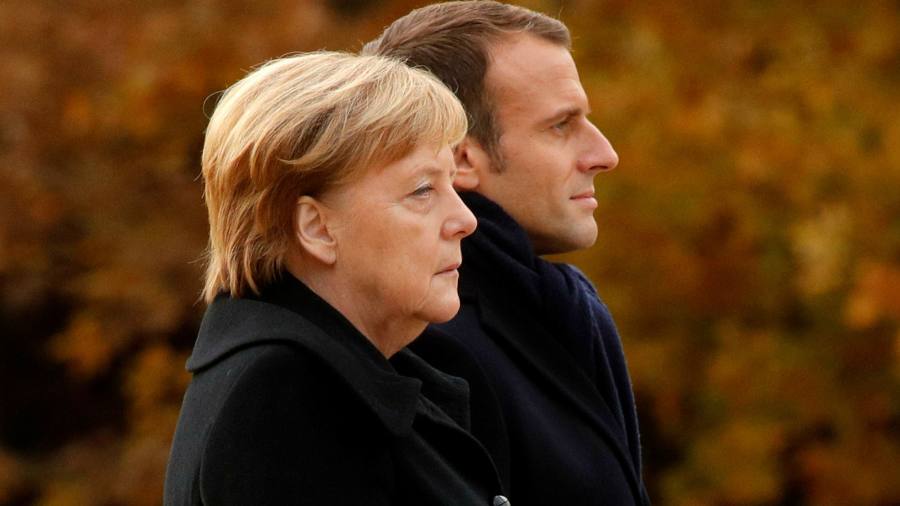[ad_1]
When Germany’s Angela Merkel assures the US that Europeans will contribute more to their own security, her aim is to persuade the Americans to maintain their presence on the continent. When France’s Emmanuel Macron calls for the EU to aim for “strategic autonomy†he is looking forward to the day when Europe can wave goodbye to the US.
These longstanding bromides still hold more than a grain of truth. For Bonn, and then Berlin, Germany’s postwar legitimacy and security have rested at once on European integration and America’s security guarantee as the leader of Nato. Macron governs as the heir to General Charles de Gaulle and to a post-Suez worldview that says the choice for Europe is between independence from, or suffocation by, the US.Â
Joe Biden should not be misled. Germany is not about to abandon its Atlanticism nor France its Gaullism. But — and this is a view calculated to offend equally Merkel and Macron — if the US president is looking for a reliable partner in Europe he would do better to head for the Elysée Palace than for the Berlin chancellery.Â
The choice might once have been sidestepped. Washington could turn to the UK as a faithful intermediary. Brexit has upended the dynamics of the so-called special relationship. Putting aside UK prime minister Boris Johnson’s chumminess with former president Donald Trump, the hard geopolitical fact is that Britain is now locked out of the deliberations of the EU. And Johnson’s standing in Paris and Berlin is not exactly high.Â
Macron’s quest for what the EU has come to call European sovereignty and strategic autonomy would seem to disqualify him from the role as best friend to the new US president. Both phrases echo the idea, physically embedded in the force de frappe, the French independent nuclear capability, that France, and Europe, should be free to decide for themselves without deference to Washington.
There is rhetoric and there is realpolitik. Europe’s right to make up its own mind does not of itself demand breaking with Washington. In Macron’s construction it might well be the right to work with the US. Sure, Macron continues to insist on the need for political engagement with Russian president Vladimir Putin. But French policymakers know that a Europe able fully to defend itself is an option on the distant horizon. Like Biden, Macron needs allies ready to step beyond rhetorical idealism.
The relationship between the White House and the Elysée has long been better than French national pride could publicly acknowledge. Back in 1979, Sir Nicholas Henderson, the UK ambassador to Paris, was writing home to complain that, in spite of a “blatantly anti-American policyâ€, France had increased its influence in Washington. In 2009, without fuss or fanfare, France rejoined Nato’s military command. Foreign policy professionals in Trump’s administration lauded France’s readiness to expend blood and treasure fighting Islamist terrorism in Africa.
The French president is ready to match words with action. Whatever the theology, France has the political will, and when necessary, the military capabilities, to work with the US. Macron is right, too, in judging that the greater the expectation of other EU states that the US will stay, the less they will contribute to their own security.
Merkel speaks the language of Atlanticism. She is privately dismissive of strategic autonomy. Her officials scoff that such phrases have been adopted by the EU only to mollify Paris. For her part, the German chancellor will admit no equal when it comes to bold declarations about upholding democracy, playing by the multilateral rules and respecting human rights.
None of this, however, can be allowed to threaten Germany’s economic interests — not least its business dealings with China and Russia. Berlin cannot be expected to choose between human rights and the overseas sales of, say, Volkswagen, BMW or Mercedes.
Merkel forced the pace for the EU to conclude a new investment pact with Beijing before Biden took office. And she stands full square behind Nord Stream 2, the Kremlin-backed project to build a new gas pipeline under the Baltic Sea. The loser? Ukraine, a nation that has had one part of its territory annexed and another occupied by Russia.
The chancellor is not about to change. She is seeing out the rest of her term before standing down later this year. Quite possibly, her successor will be less mercantilist, especially if the Green party forms part of the next governing coalition. But if Biden wants a reliable European partner, he would do better to look to America’s oldest ally.
[ad_2]
Source link





